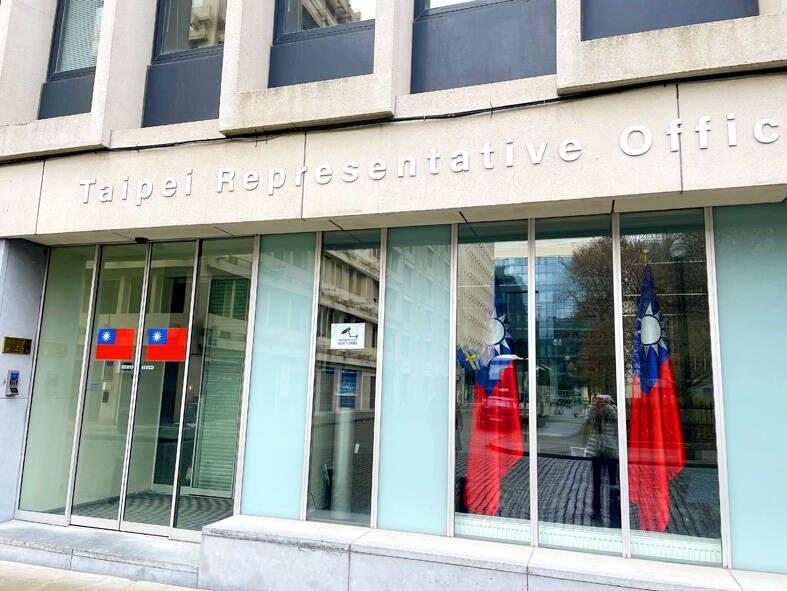The Ministry of Foreign Affairs (MOFA) yesterday condemned Chinese efforts to suppress Taiwan’s international space, after a report by the International Consortium of Investigative Journalists detailed pressure from the Chinese embassy in Belgium to remove the Taiwanese flag flying in front of the nation’s representative office in 2022.
The flag was removed in January 2023 and the intent to have Taiwan as the guest of honor at last year’s Brussels International Book Fair was also canceled out of concern about China’s reaction, according to a report in Belgium’s French-language newspaper Le Soir.
The report was part of the “China Targets” series by the consortium, which investigates how Beijing “abuses international institutions to terrorize its critics and extend its repressive tactics worldwide.”

Photo: CNA
Brussels International Book Fair director Tanguy Roosen told the newspaper that the fair had wanted to focus on Asian nations last year, but the Belgian Ministry of Foreign Affairs warned against the idea.
It is evident that the Belgian government is cautious when it comes to dealing with China, he said.
The Central News Agency (CNA) said that its reporters had witnessed the flag being taken down, but decided not to report on the incident to prevent affecting Taiwan-Belgium relations.
China’s attempts to define the Taiwan issue as one of “domestic politics” seek to isolate Taiwan from international support, MOFA said in a statement.
“We call on the international community to take tangible action against China’s attempts to disrupt the status quo,” it said.
The international community must clearly state that it stands against Beijing’s use of legal, psychological and media warfare against Taiwan to jointly uphold stability and prosperity in the Taiwan Strait and the Indo-Pacific region, it added.
Representative to Belgium Roy Lee (李淳) told CNA that China’s oppression of Taiwan has been pervasive and relentless, and Taiwan’s diplomatic corps would continue to advocate for the nation’s rights to be recognized and heard by the international community.
Sara van Hoeymissen, a world politics lecturer at the Royal Military Academy of Belgium, said that the representative office is walking a tightrope in terms of what can or cannot be done diplomatically.
The Chinese embassy is constantly contacting the Belgian government regarding the formal appellation used for Taiwan on official documents and demands that any form of address given to Taiwan should refrain from being associated with independence, Van Hoeymissen said.
If the Chinese embassy chooses to, it can devote a great deal of resources to inundating the Taiwan representative office with letters and complaints, she said.

‘WIN-WIN’: The Philippines, and central and eastern European countries are important potential drone cooperation partners, Minister of Foreign Affairs Lin Chia-lung said Minister of Foreign Affairs Lin Chia-lung (林佳龍) in an interview published yesterday confirmed that there are joint ventures between Taiwan and Poland in the drone industry. Lin made the remark in an exclusive interview with the Chinese-language Liberty Times (the Taipei Times’ sister paper). The government-backed Taiwan Excellence Drone International Business Opportunities Alliance and the Polish Chamber of Unmanned Systems on Wednesday last week signed a memorandum of understanding in Poland to develop a “non-China” supply chain for drones and work together on key technologies. Asked if Taiwan prioritized Poland among central and eastern European countries in drone collaboration, Lin

The Chien Feng IV (勁蜂, Mighty Hornet) loitering munition is on track to enter flight tests next month in connection with potential adoption by Taiwanese and US armed forces, a government source said yesterday. The kamikaze drone, which boasts a range of 1,000km, debuted at the Taipei Aerospace and Defense Technology Exhibition in September, the official said on condition of anonymity. The Chungshan Institute of Science and Technology and US-based Kratos Defense jointly developed the platform by leveraging the engine and airframe of the latter’s MQM-178 Firejet target drone, they said. The uncrewed aerial vehicle is designed to utilize an artificial intelligence computer

Renewed border fighting between Thailand and Cambodia showed no signs of abating yesterday, leaving hundreds of thousands of displaced people in both countries living in strained conditions as more flooded into temporary shelters. Reporters on the Thai side of the border heard sounds of outgoing, indirect fire yesterday. About 400,000 people have been evacuated from affected areas in Thailand and about 700 schools closed while fighting was ongoing in four border provinces, said Thai Rear Admiral Surasant Kongsiri, a spokesman for the military. Cambodia evacuated more than 127,000 villagers and closed hundreds of schools, the Thai Ministry of Defense said. Thailand’s military announced that

CABINET APPROVAL: People seeking assisted reproduction must be assessed to determine whether they would be adequate parents, the planned changes say Proposed amendments to the Assisted Reproduction Act (人工生殖法) advanced yesterday by the Executive Yuan would grant married lesbian couples and single women access to legal assisted reproductive services. The proposed revisions are “based on the fundamental principle of respecting women’s reproductive autonomy,” Cabinet spokesperson Michelle Lee (李慧芝) quoted Vice Premier Cheng Li-chiun (鄭麗君), who presided over a Cabinet meeting earlier yesterday, as saying at the briefing. The draft amendment would be submitted to the legislature for review. The Ministry of Health and Welfare, which proposed the amendments, said that experts on children’s rights, gender equality, law and medicine attended cross-disciplinary meetings, adding that